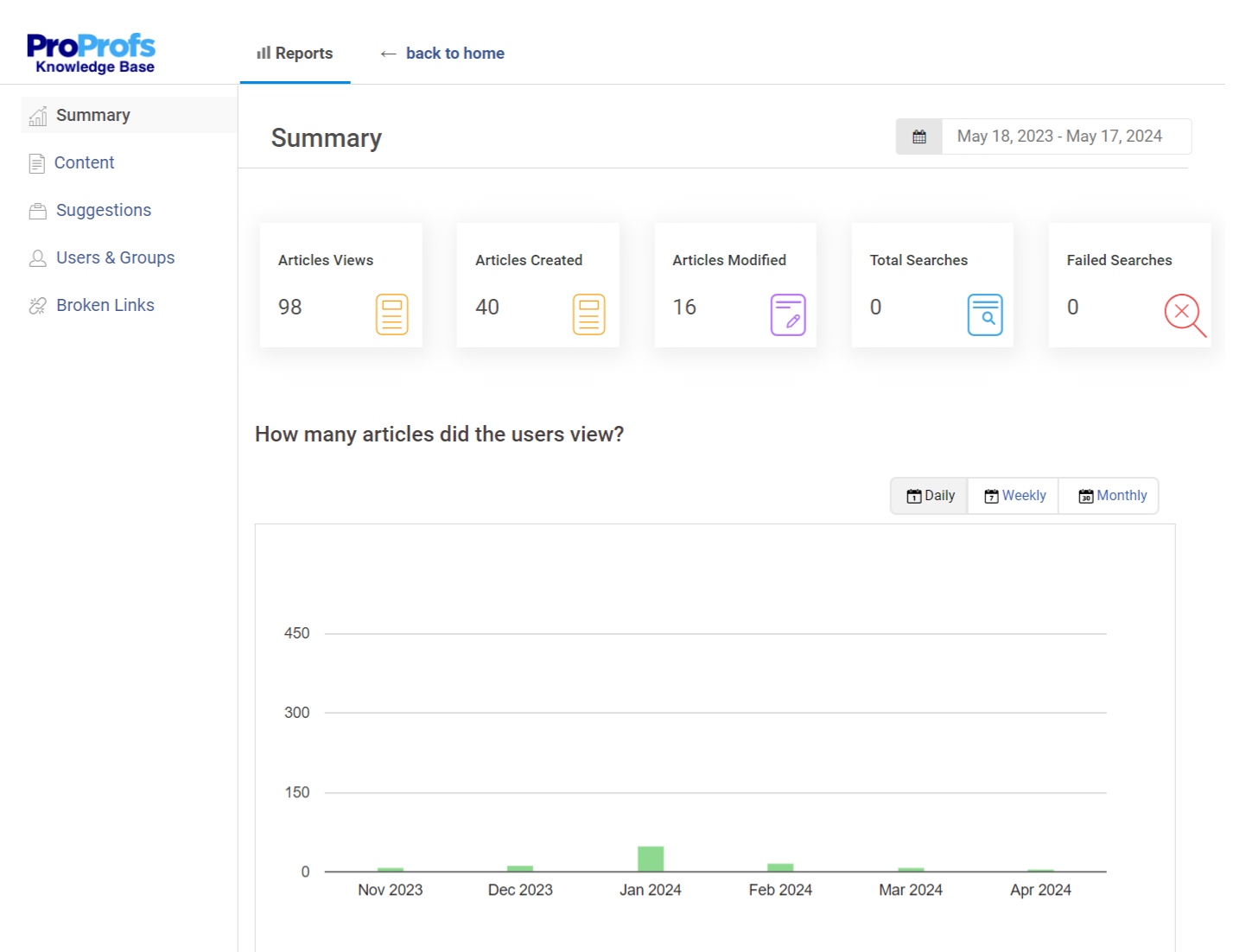Would you drive a car without a speedometer or fuel gauge? No, right? Because you wouldn’t know how fast you’re going or how much fuel you have left.
Similarly, managing knowledge without tracking key knowledge management metrics can leave you feeling lost and unsure of your progress.
Knowledge management metrics provide valuable insights into the effectiveness of your knowledge initiatives. They help you understand how your knowledge base software is being used, identify areas for improvement, and measure the impact of your efforts on key business outcomes.
In this blog, we’ll explore the importance of knowledge management metrics, the key metrics you should track, and the four pillars of knowledge management.
What Is the Importance of Knowledge Management Metrics?
Tracking knowledge management metrics is essential for understanding the effectiveness of your knowledge initiatives. Here are a few points that highlight the importance of tracking knowledge management metrics:
Track the Effectiveness & Identify Areas for Improvement
Metrics provide a clear picture of how your knowledge base is being used, how users engage with your content, and where there might be gaps or areas for improvement.
This data-driven insight lets you make informed decisions about content creation, organization, and knowledge-sharing strategies.
Demonstrate the Value of Knowledge Management
By tracking metrics like reduced support costs, improved employee productivity, and enhanced customer satisfaction, you can demonstrate the tangible benefits of knowledge management to your organization.
This helps secure buy-in from stakeholders and justify further investment in knowledge initiatives.
Measure Progress & ROI
Metrics enable you to track progress toward your knowledge management goals and measure your efforts’ return on investment (ROI).
This data-driven approach helps you identify what’s working well and what needs adjustment, ensuring continuous improvement and maximizing the impact of your knowledge management program.
Enhance Content & User Experience
Metrics provide valuable insights into user behavior, such as search trends, popular content, and areas where users struggle to find information.
This allows you to optimize your knowledge base content, improve navigation, and enhance the overall user experience.
Encourage a Culture of Knowledge Sharing
By tracking metrics like content contributions, knowledge reuse, and collaboration activities, you can foster a culture of knowledge sharing within your organization.
Recognizing and rewarding contributions encourages active participation and strengthens the knowledge ecosystem.
Align Knowledge Management with Business Goals
Tracking knowledge management metrics helps you align your knowledge initiatives with your business objectives.
By measuring the impact of knowledge management on key performance indicators (KPIs), you can ensure that your efforts contribute to the organization’s success.
What Are the Four Pillars of Knowledge Management Metrics?
Knowledge management (KM) metrics measure the effectiveness and impact of the knowledge management strategies within your organization. These metrics revolve around four essential pillars:
Content Metrics
It focuses on the volume, quality, and relevance of knowledge resources. These knowledge management analytics include the number of articles created, updates made, and content accuracy. It ensures that your knowledge base is robust and regularly maintained.
Usage Metrics
It tracks how employees or users interact with the knowledge base. It includes metrics like search frequency, most viewed articles, and popular keywords, reflecting content utility and accessibility.
Engagement Metrics
It measures user involvement and satisfaction, such as article ratings, feedback received, and time spent on pages. These insights highlight user perception and content effectiveness.
Operational Metrics
It evaluates the efficiency of KM processes, including response times for content creation, article lifecycles, and resource allocation. It helps optimize workflows and ensure timely knowledge delivery.
What Are the Top Knowledge Management Metrics You Should Measure?
Tracking knowledge management metrics helps comprehensively understand your knowledge initiatives’ performance and impact. Here are some essential knowledge management metrics to measure:
Content Metrics

1. Article Views: Track the number of times each article is viewed to identify popular content and understand user interests.
2. Failed Searches: Monitor searches that yield no results to identify knowledge gaps and address unmet information needs.
3. Content Creation Rate: Measure how frequently new articles are added to your knowledge base to assess content freshness and growth.
4. Content Update Frequency: Track how often articles are updated to ensure information remains current and relevant.
5. Content Reuse: Measure how often existing content is repurposed or reused across different channels or formats.
- User Engagement Metrics
6. Search Usage: Track the number of searches performed and analyze search terms to understand user behavior and information needs.
7. Time Spent on Page: Measure how long users spend on each article to gauge content engagement and identify areas for improvement.
8. Bounce Rate: Monitor how often users leave your knowledge base after viewing only one page, indicating potential navigation or content issues.
9. User Feedback: Collect feedback through surveys, ratings, or comments to understand user satisfaction and identify areas for improvement.
Impact Metrics
10. Support Ticket Deflection: Measure the reduction in support tickets or inquiries attributed to the knowledge base, demonstrating its impact on self-service success.
11. Employee Productivity: Track employee efficiency and productivity improvements resulting from easier access to information and knowledge sharing.
12. Customer Satisfaction: Monitor customer satisfaction ratings and feedback related to the knowledge base and its impact on their experience.
Alignment Metrics
13. Contribution to KPIs: Assess how the knowledge base contributes to achieving organizational and customer key performance indicators (KPIs), such as increased sales, reduced costs, or improved customer retention.
14. Employee Engagement: Measure employee participation in knowledge-sharing activities such as content creation, editing, and feedback contributions.
Optimize Knowledge Management Using Success Metrics
Knowledge management metrics are essential for measuring the effectiveness of your knowledge initiatives, identifying areas for improvement, and demonstrating the value of knowledge as a strategic asset.
Remember, knowledge management is an ongoing journey, not a destination. Regularly review your metrics, gather user feedback, and adapt your strategies to ensure your knowledge initiatives align with your organization’s evolving needs and goals.
With ProProfs Knowledge Base, you can easily track key metrics like total searches, failed searches, articles created, total reads, etc. You can also gain valuable insights into your popular and poorly rated articles, failed keywords, new articles created, and more. Explore the tool more or request a demo below.
FREE. All Features. FOREVER!
Try our Forever FREE account with all premium features!







